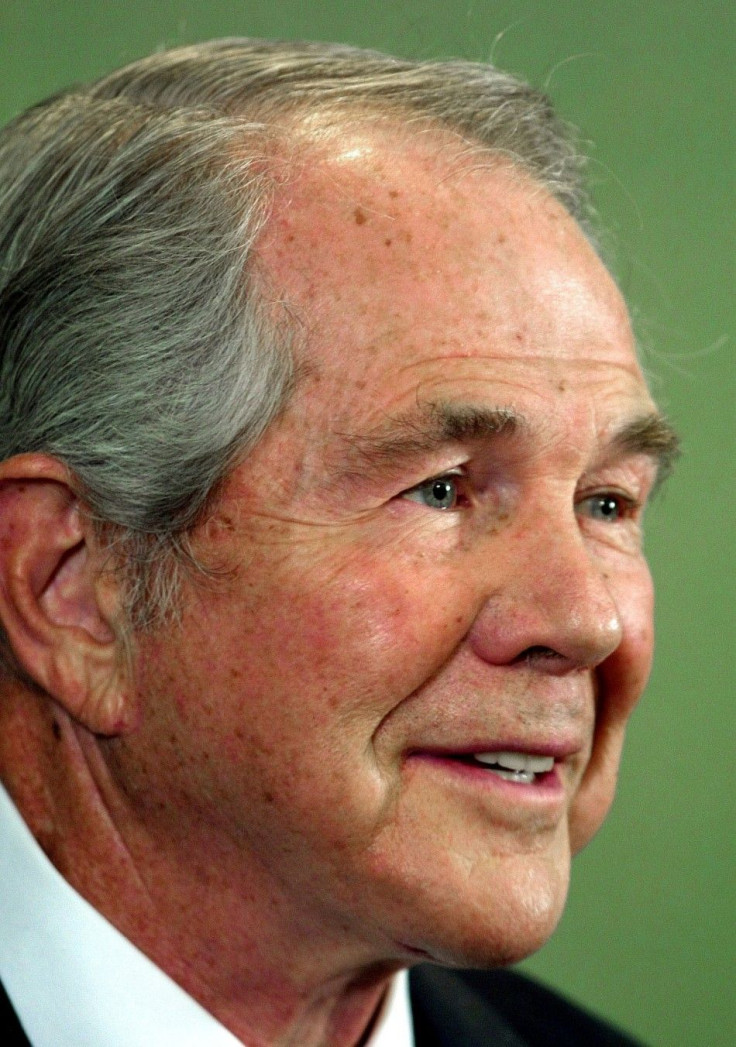Pat Robertson For Marijuana Legalization: Why Other Conservatives Agree
Analysis

In a move that may surprise some, conservative evangelical leader Rev. Pat Robertson has called for legalization of marijuana.
I really believe we should treat marijuana the way we treat beverage alcohol, he told The New York Times Wednesday. I've never used marijuana and I don't intend to, but it's just one of those things that I think: This war on drugs just hasn't succeeded.
The longtime religious right leader and former presidential candidate has a reputation for provocative comments that outrage liberals and moderates. He has labeled feminism a socialist movement, insisted that Islam is not a religion, and attributed natural disasters to divine judgment for tolerance of homosexuality.
This time, Robertson's own flock are the ones who might be shocked.
But should they be? Allen St. Pierre, executive director of the National Organization for the Reform of Marijuana Laws, says marijuana legalization appeals to many conservatives.
It strikes one as almost untoward, having someone like Pat Robertson coming out in favor of legalization, he said. But this is one more example of how even traditional opponents to marijuana law reform have come to recognize and speak publicly about why there needs to be some change in the status quo. The idea that someone can get arrested, persecuted and potentially incarcerated doesn't strike Mr. Robertson, as a fiscal and moral conservative, as making sense. And in some ways, he is following a very long lineage.
Plenty of conservatives before Robertson have argued against the criminalization of cannabis. The late William F. Buckley Jr., founder of the National Review, wrote many nationally syndicated columns in favor of legalization. Milton Friedman also supported the idea. So do Glenn Beck, Thomas Sowell and George Shultz. Conservative think tanks like the Cato Institute and the American Enterprise Institute have recommended legalization.
About the only think tank that does not support it is the Heritage Foundation, said St. Pierre. That organization did not respond to requests for comment.
Robertson's recent statements do not constitute a change of heart; he's spoken out for legalization before, even on camera during his live television program, The 700 Club.
I was assailed by those who thought that it was terrible that I had forsaken the straight and narrow, he said. Still, he stuck to his guns. I just want to be on the right side. And I think on this one, I'm on the right side.
The public agrees, according to a Gallup poll conducted in October 2011. A full 50 percent of Americans said marijuana use should be made legal, compared to 46 percent who disagreed. The rest were undecided. And the history of the survey reveals an unmistakable trend: The number of people supporting legalization has grown steadily since the poll began in 1969, and looks to keep rising as generations shift.
It's not just public opinion: Laws are changing, state by state. Medical marijuana is legal in 16 states plus the District of Columbia, and other states have bills in the works. In addition, 14 states have officially decriminalized marijuana, along with some municipalities like Philadelphia, Denver and Seattle.
Decriminalization is not the same as legalization, but St. Pierre calls it a step in the right direction. If there is a choice between no reform and decriminalization, we will always favor decriminalization, he said.
To illustrate, he compared Ohio to its neighbor Indiana. Let's say you're an adult caught with 100 grams of marijuana, he said. In Ohio, it's a 10-minute interaction. The police take the contraband, we presume they destroy it, and they fine the individual $100. It's treated like a parking ticket or a speeding violation, and that $100 is some pretty good money for the state to make in 10 minutes.
That's because Ohio decriminalized marijuana possession in 1978. But cross into the state of Indiana, and holy moly does that marijuana change its legal status! St. Pierre continued. A person can be arrested, prosecuted and punished, and that punishment can take the form of incarceration. All that infrastructure -- a lawyer, a court hearing, a judge -- is costing the citizens of Indiana thousands of dollars. And do people in Indiana, who face these harsh penalties, use less marijuana than they do in Ohio? No! So the deterrent factor has failed.
For St. Pierre and others, a patchwork process of state-by-state decriminalization can pave the way for policy changes at the federal level. Soon, they believe, marijuana use will be just as legal as a stiff drink.
Decriminalization does not offer the same type of social controls that you get with legalization, and arguably we want more control as a society over this, St. Pierre explained. Prohibition is the abdication of control. We lose that tax revenue, and leaving it to the black market strengthens the criminal element. So after 75 years in this country of marijuana prohibition, it would appear we are ready to depart from that epoch and move towards legalizing.
With Robertson on board, the United States may be inching closer to federal legalization. But even he knows that other evangelical leaders might take a while to come around. I think they would agree if they understood the facts as I do, said Robertson. But it's very hard.
© Copyright IBTimes 2025. All rights reserved.






















